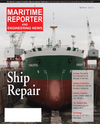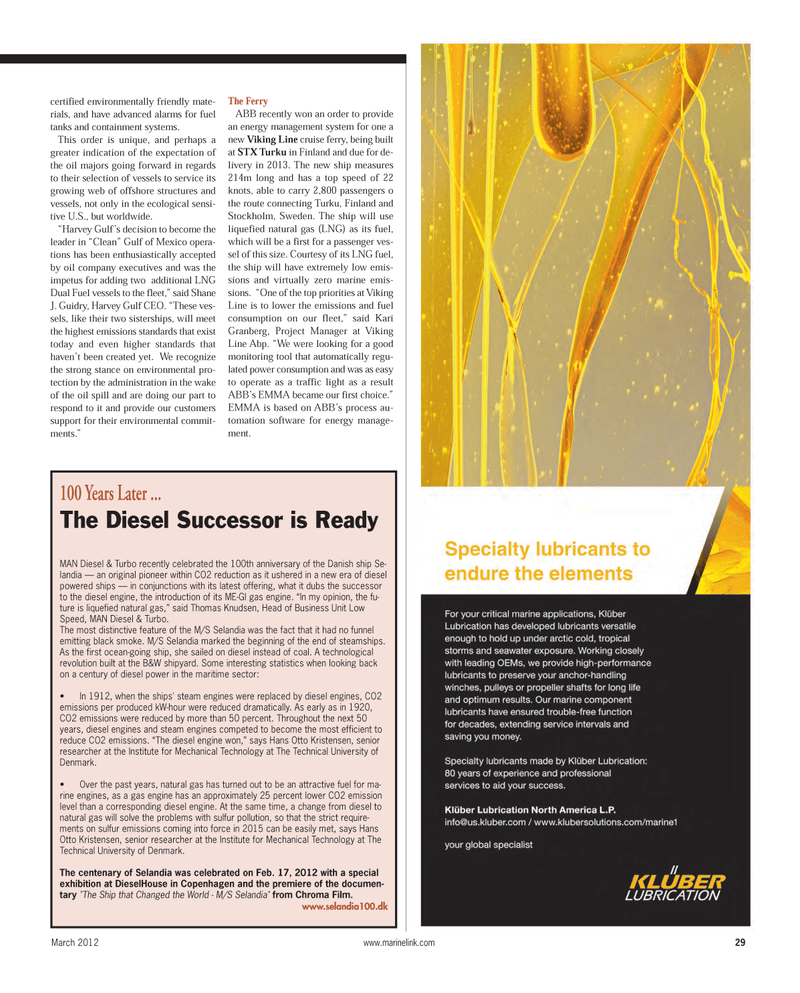
Page 29: of Maritime Reporter Magazine (March 2012)
The Ship Repair Edition
Read this page in Pdf, Flash or Html5 edition of March 2012 Maritime Reporter Magazine
March 2012 www.marinelink.com 29100 Years Later ... The Diesel Successor is ReadyMAN Diesel & Turbo recently celebrated the 100th anniversary of the Danish ship Se- landia ? an original pioneer within CO2 reduction as it ushered in a new era of diesel powered ships ? in conjunctions with its latest offering, what it dubs the successor to the diesel engine, the introduction of its ME-GI gas engine. ?In my opinion, the fu- ture is liquefied natural gas,? said Thomas Knudsen, Head of Business Unit Low Speed, MAN Diesel & Turbo. The most distinctive feature of the M/S Selandia was the fact that it had no funnel emitting black smoke. M/S Selandia marked the beginning of the end of steamships.As the first ocean-going ship, she sailed on diesel instead of coal. A technologicalrevolution built at the B&W shipyard. Some interesting statistics when looking back on a century of diesel power in the maritime sector:In 1912, when the ships' steam engines were replaced by diesel engines, CO2 emissions per produced kW-hour were reduced dramatically. As early as in 1920, CO2 emissions were reduced by more than 50 percent. Throughout the next 50 years, diesel engines and steam engines competed to become the most efficient to reduce CO2 emissions. ?The diesel engine won,? says Hans Otto Kristensen, senior researcher at the Institute for Mechanical Technology at The Technical University of Denmark.Over the past years, natural gas has turned out to be an attractive fuel for ma- rine engines, as a gas engine has an approximately 25 percent lower CO2 emission level than a corresponding diesel engine. At the same time, a change from diesel to natural gas will solve the problems with sulfur pollution, so that the strict require- ments on sulfur emissions coming into force in 2015 can be easily met, says Hans Otto Kristensen, senior researcher at the Institute for Mechanical Technology at The Technical University of Denmark. The centenary of Selandia was celebrated on Feb. 17, 2012 with a specialexhibition at DieselHouse in Copenhagen and the premiere of the documen- tary "The Ship that Changed the World - M/S Selandia" from Chroma Film. www.selandia100.dk certified environmentally friendly mate- rials, and have advanced alarms for fuel tanks and containment systems. This order is unique, and perhaps agreater indication of the expectation of the oil majors going forward in regards to their selection of vessels to service its growing web of offshore structures and vessels, not only in the ecological sensi- tive U.S., but worldwide. ?Harvey Gulf?s decision to become the leader in ?Clean? Gulf of Mexico opera- tions has been enthusiastically acceptedby oil company executives and was the impetus for adding two additional LNG Dual Fuel vessels to the fleet,? said Shane J. Guidry, Harvey Gulf CEO. ?These ves- sels, like their two sisterships, will meet the highest emissions standards that exist today and even higher standards that haven?t been created yet. We recognize the strong stance on environmental pro- tection by the administration in the wake of the oil spill and are doing our part torespond to it and provide our customers support for their environmental commit- ments.? The Ferry ABB recently won an order to provide an energy management system for one a new Viking Line cruise ferry, being built at STX Turku in Finland and due for de-livery in 2013. The new ship measures 214m long and has a top speed of 22knots, able to carry 2,800 passengers othe route connecting Turku, Finland and Stockholm, Sweden. The ship will use liquefied natural gas (LNG) as its fuel, which will be a first for a passenger ves- sel of this size. Courtesy of its LNG fuel,the ship will have extremely low emis- sions and virtually zero marine emis-sions. ?One of the top priorities at Viking Line is to lower the emissions and fuel consumption on our fleet,? said Kari Granberg, Project Manager at Viking Line Abp. ?We were looking for a good monitoring tool that automatically regu- lated power consumption and was as easy to operate as a traffic light as a result ABB?s EMMA became our first choice.? EMMA is based on ABB?s process au- tomation software for energy manage- ment.MR March 12 # 4 (25-32):MR Template 3/6/2012 3:10 PM Page 29

 28
28

 30
30
